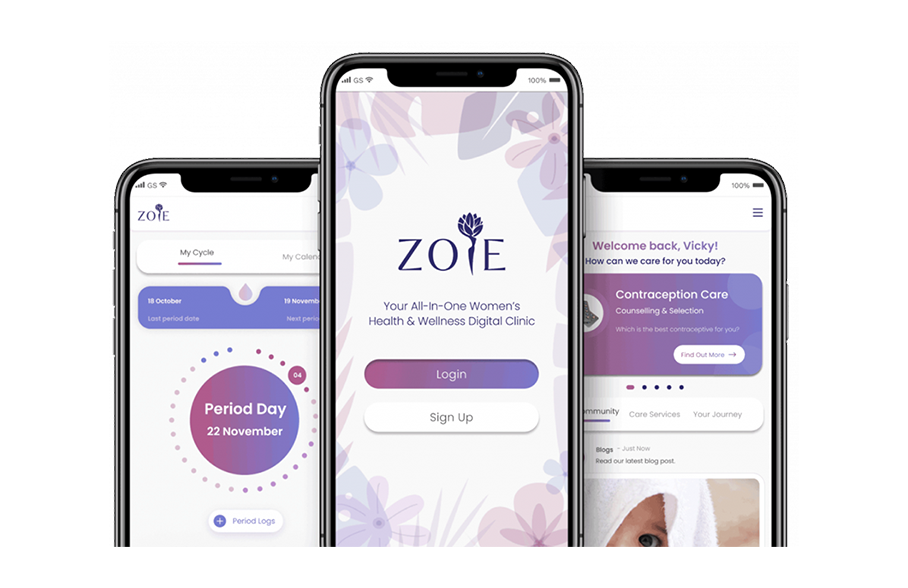
Game-changing solutions all begin the same way—as a promising new idea to solve a complex problem. For cousins and co-founders Thato Schermer and Dr. Nonie Sitole, solving problems in women’s health has always been a family passion. Their grandmother was a midwife, and Dr. Sitole’s mother was South Africa’s first Black female obstetrician-gynecologist. “Hearing [my aunt’s] experiences around what she’s seen and the access—and lack of access—to healthcare fascinated me,” says Schermer. “I became really interested in how we look beyond one doctor serving one patient and look to solving these problems at scale.”
Together, they launched Zoie Health, a digital health platform, to make women’s health and wellness more convenient and affordable. Patients across Africa can connect directly with their doctors over video and text and even receive prescriptions right at their doorstep.
The company recently took first place at both the New Venture Competition at the Harvard Business School and the Stanford Africa Business Forum Venture Competition. Both competitions were sponsored by Prosper Africa as part of its Pitch Prosper Africa series, which reflects the initiative’s commitment to engaging businesses and investors led by young people, women, and members of the African Diaspora.
This series of Prosper Africa-sponsored pitch competitions invites entrepreneurs across Africa and the U.S.-based Diaspora to pitch their businesses and compete for prizes, including the opportunity to be featured in the Prosper Africa Virtual Deal Room. The Prosper Africa Virtual Deal Room connects a curated group of African and Diaspora companies raising capital with U.S. investors across Prosper Africa’s network of over 700 users. Prosper Africa’s transaction advisors are also available to help businesses and investors package, promote, and advance deal opportunities.
We spoke with co-founder Thato Schermer about how Zoie Health came together and the importance of building a community in public health.
This interview has been edited for clarity and length.
What gap in the South African healthcare market led you to launch Zoie Health?
Thato Schermer: It began on the back of our own personal experiences with women’s health. I was shocked at how expensive it was to visit the gynecologist, get a contraceptive prescription, and then fill it at a pharmacy. And for Nonie (Sitole, co-founder), it was motherhood that motivated her. She experienced postpartum depression and realized how lonely it could be without proper support. She needed a community to share her experiences with and a real professional to point her in the right direction.
We began talking to friends, family members, and other women and heard the same problems over and over again. And we thought, “Okay, this isn’t just unique to you and me, this is also something that’s relevant to so, so, so, many women.” And it’s something that we wanted to solve. That’s why we launched Zoie Health. It’s Africa’s first digital women’s health clinic focused on providing care for women. We offer virtual consults with more than 50 different providers focused on women’s health, we allow women to get their contraceptives delivered to them every single month, and we provide a community chat where women can connect with each other and with their doctors.
Let’s talk about that community aspect a bit more. Why was it important to include that element in the Zoie Health platform?
Schermer: Through our research, we learned that there’s this whole universe of mother support groups and pregnancy support groups where women connect with one another and give each other advice and support as they go through their pregnancies or become mothers. Across countries, we noticed that the Facebook groups with the highest engagement focused on pregnancy and motherhood.
And if you think about it, women have been connecting with and supporting each other on these journeys for centuries. Friends would share tips on how to deal with your baby’s colic. Your grandmother would share advice on soothing a teething baby. Or perhaps your mother would come and stay with you after you gave birth, allowing you to take care of yourself, to sleep, to rest, to eat well while she also helps with the baby and gives you tips on those early, difficult stages.
This is something that women look for during their pregnancy, motherhood, and wellness journeys. We decided we had to help build community as a foundation of Zoie Health. It drives engagement, and it drives trust. Zoie Health then becomes a true platform, not just a transactional website.

COVID-19 has dramatically changed the landscape in healthcare and technology. What impact did that have on your business idea?
Schermer: When the pandemic began, I was working in business development with UBER. I loved my job and the work but realized that we were facing the greatest health crisis of our time. I needed to be doing something more. What we saw in South Africa—and around the world—is people growing more comfortable doing things online. We’d already seen the uptake of e-commerce, but this was the first time we were beginning to see telemedicine and virtual healthcare grow in a meaningful way. That opened the door to solving some of those healthcare access challenges if we could meet women right at their virtual doorstep.
Zoie Health recently took first place at both the New Venture Competition at the Harvard Business School and the Stanford Africa Business Forum Venture Competition. What drew you to these competitions? And what kind of value do these types of engagements bring to both African businesses and U.S. investors?
Schermer: What’s great about competitions like these is that you have the chance to meet with amazing business leaders and advisors. Even if you don’t win, you have the chance to get really good feedback and insights on your business. For us as a new company in South Africa, it also helps give us a level of credibility to be among these world-recognized brands and institutions.
Throughout our journey, we’ve had amazing support—including advice and input—from U.S. venture capital investors. It’s helped us think of our business on a global level and not just in our own little bubble. And also, in some ways, the U.S. capital market is more accessible. When you have that capital to build out your idea, then you can really shape your startup meaningfully.
Pitch Prosper Africa is a series of Prosper Africa-sponsored pitch competitions that invites entrepreneurs across Africa and the U.S.-based Diaspora to pitch their businesses and compete for prizes, including the opportunity to be featured in the Prosper Africa Virtual Deal Room.

